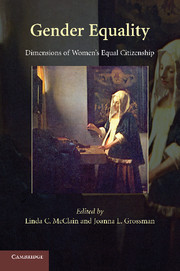Book contents
- Frontmatter
- Contents
- Contributors
- Acknowledgments
- Gender Equality
- Introduction
- PART I CONSTITUTIONAL CITIZENSHIP AND GENDER
- PART II POLITICAL CITIZENSHIP AND GENDER
- PART III SOCIAL CITIZENSHIP AND GENDER
- PART IV SEXUAL AND REPRODUCTIVE CITIZENSHIP
- PART V GLOBAL CITIZENSHIP AND GENDER
- Suggested Readings
- Index
- References
Introduction
Published online by Cambridge University Press: 05 August 2012
- Frontmatter
- Contents
- Contributors
- Acknowledgments
- Gender Equality
- Introduction
- PART I CONSTITUTIONAL CITIZENSHIP AND GENDER
- PART II POLITICAL CITIZENSHIP AND GENDER
- PART III SOCIAL CITIZENSHIP AND GENDER
- PART IV SEXUAL AND REPRODUCTIVE CITIZENSHIP
- PART V GLOBAL CITIZENSHIP AND GENDER
- Suggested Readings
- Index
- References
Summary
This book addresses a basic problem: a commitment to gender equality and to the equal citizenship of women and men features in the constitutional, statutory, and common law of many countries, as well as in international law and human rights instruments. Yet there remains a palpable and, in some cases, stark gap between formal commitments to the equal rights and responsibilities of men and women and against discrimination and subordination based on sex and the gendered realities of women's lives. Few would deny that women around the globe – and the societies in which they live – have made enormous progress toward the goals of gender equality and equal citizenship, but neither would most claim that those goals have been fully realized in life as well as in law. There continues to be ambivalence about and resistance to equality as well as legal, political, and social obstacles to attaining it.
This book takes stock of the progress toward and remaining impediments to the goals of securing gender equality and the equal citizenship of women and men. It develops strategies for securing such goals and identifies new questions, theories, and perspectives to help shape further inquiries about both gender equality and equal citizenship. It brings together an interdisciplinary group of distinguished scholars in law, political science, and women's studies to investigate several dimensions of women's equal citizenship.
Why use the language of equal citizenship to guide this inquiry about gender equality and the persistence of inequality?
- Type
- Chapter
- Information
- Gender EqualityDimensions of Women's Equal Citizenship, pp. 1 - 20Publisher: Cambridge University PressPrint publication year: 2009

